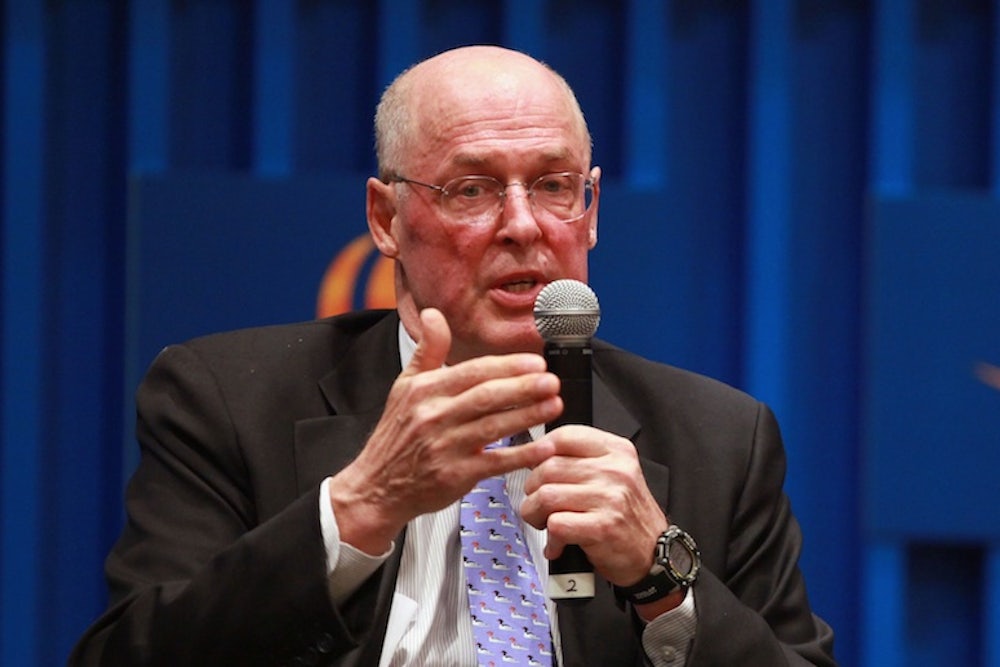What does it take to scare a CEO? It’s a question that two smart writers raised implicitly in recent articles. The eventual answer will say a lot about the future of American politics—and the planet.
One of the writers is James Surowiecki, from the New Yorker, who in this week’s issue offers a eulogy for the old U.S. business establishment. For most of the 20th century, Surowiecki explains, members of this group they saw themselves as part of a governing elite, engaged in serious conversations with political leaders about the future of the country. These heads of industry weren’t generally liberals, obviously, but sometimes they embraced relatively liberal reforms. It happened in during the Progressive Era, the New Deal, and then the postwar era, on issues ranging from the minimum wage to Civil Rights.
Their primary motive was not typically altruism or civic virtue, Surowiecki acknowledges. It was more enlightened self-interest—in some cases, an effort to stave off more radical reforms, like socialism or even communism. But these business leaders also seemed more capable of thinking about the long term—and the fact that their own well-being was tied up with the well-being of the rest of the country. “At the very top, corporate leaders were much more moderate and pragmatic,” says Mark Mizruchi, the University of Michigan sociologist whose research and writing is the basis for Surowiecki’s article. “They believed that in order to maintain their privileges, they had to insure that ordinary Americans were having their needs met.” (Readers will also recognize these themes from The Paradox of American Democracy, by my colleague John Judis.)
As it happens, an attempt to rekindle that sense of stewardship is now underway. It’s taking place in the climate change debate—most conspicuously, through the efforts of people like Hank Paulson, former head of Goldman Sachs and former Treasury Secretary to President George W. Bush. Paulson, whose work on environmentalism predates his service in the Bush Administration, is among a group of finance leaders urging the rest of the business community to take climate change seriously, because it threatens their future profits.
Will it work? Chris Mooney, writing in Mother Jones, has been skeptical. The heart of the conservative movement is the Tea Party, Mooney notes, and the Tea Party distrusts big business almost as much as it distrusts big government: “The right is not its old self, and once trusted messengers aren’t trusted anymore…If this was the United States of 30 years ago, we’d already have a bipartisan consensus on climate change.”
You should take Mooney seriously on this, because he is a bona fide expert in both climate science and the intellectual habits of the right wing. (He’s written highly praised books on both subjects.) But environmentalists don’t need to win over the entire business community to make some headway. Just a little support could help blunt the political opposition and that kind of progress, certainly, seems within the realm of possibility. After all, the leaders of corporate America live in places like New York and Miami and Southern California—where rising seas and other climate disasters will eventually take their most severe tolls.
It’s not the same existential threat that CEOs thought they faced from radical ideologues in the 20th century. But it’s not so entirely different, either.
—Jonathan Cohn
Things to know about
IMMIGRATION: White House Press Secretary Josh Earnest declared that most of the unaccompanied minors crossing the border illegally will not qualify for humanitarian relief and will eventually be deported. But, according to the Associated Press, President Obama has backed off from requesting extra legal authority to deport unaccompanied kids to their home countries more quickly. If you have the impression that this is a really complicated situation, made worse by a refusal to pass immigration reform, then you are right.
SAFETY NET: The next big fight over Social Security is here, with some familiar contours: Republicans insisting the program needs radical changes, Democrats arguing for modest fixes and even some expansion. But the issue this time won’t be retirement benefits. It’ll be the disability program. (Greg Sargent, Washington Post)
Things to read
Bring back death panels! Harold Pollack thinks it’s time to rescue the idea that died when Betsey McCaughey and Sarah Palin demagogued it right out of health care reform. (Politico magazine)
Numbers don’t lie, but they don’t always tell the whole truth. Dean Baker explains that why the most commonly used statistic to describe the economy, Gross Domestic Product, fails to capture societal well-being. (Center for Economic and Policy Research) His point of departure is an op-ed, by Lew Daly of Demos, on the same subject. (New York Times)
Spending money in all the wrong places. Two scholars say we’re putting too much money into health care services, but too little money into other programs that improve health. Adrianna McIntyre interviews them. (Vox)
Things to watch
The White House is preparing for Obama’s visit to Texas on Wednesday and Thursday, and now the itinerary includes some kind of “substantive meeting” with Governor Rick Perry about the border crisis. That means immigration is about to get even more attention—as it should.
Things to check out at QED
Danny Vinik gives some relationship advice to Paul Ryan, who’s discovering the conservative wonks are falling out of love with him. Rebecca Leber warns that a deal to save the controversial Export-Import Bank might involve letting it finance the very type of carbon-intensive power plants that the Obama Administration is trying to curtail.
